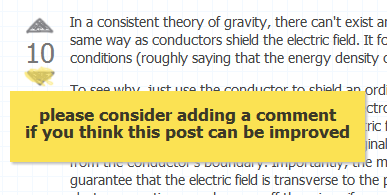Why is voting without a comment justifying the vote allowed ?
I can see the usefulness of having a graded and changing answer list ( though sometimes it is a bit funny, getting an answer before the comment that gave rise to it). Also the usefulness of keeping all answers in the voting result order: It gives what people consider the clearest answer top position.
When anonymity is taken into account though, this can lead to a group think of people down voting people with whom they do not agree, even for answers that are reasonable and clear. If each voter justifies the vote ( unphysical, not clear enough, trivial, or whatever) it will give readers a rational reason for the down voting and provoke further thoughts to the one who wrote the answer. The judge should be open to judgment and moderation too.
For example, I saw a down vote in a comment that said "you have been told that this is not the place to talk of your own theories". This goes against the open format of this forum. If Nima Arkani-Hamed had been answering a question using his new twistor revolution concepts would one say "this is not the place to talk of your own theories" ? As long as it is clear that it is a new out of the beaten path proposal censorship should be avoided, imo.
We all know that scientific questions are not decided by consensus but by physics and mathematics clearly stated. The concept of this forum is admirable, but I think that the voting procedure needs some tweaking.

